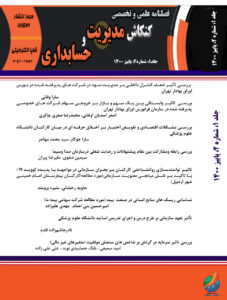مقاله: پژوهشی
صفحه: 153- 170
نویسندگان:
محمد احسانی فر[1]، فاطمه دکامینی[2]
[1] فوق دکتری تخصصی مهندسی صنایع، گروه مهندسی صنایع،دانشگاه آزاد اسلامی،اراک،ایران(نویسنده مسئول).
[2] دانشجوی دکتری مدیریت صنعتی، گروه مدیریت صنعتی،دانشگاه آزاد اسلامی،اراک،ایران.
چكيده
کليد موفقيت تجاري براي بسياري از بانک ها، استفاده صحيح از داده ها جهت اخذ تصميمات بهتراست. بانک ها براي رسيدن به اين هدف نيازمند استفاده از ابزارهاي قوي و کارآمد مانند هوش تجاري در سیستم های اطلاعاتی خود به عنوان کاتاليزور مثبت هستند. استفاده از هوش تجاری و تحلیل های تجاری برای پشتیبانی از تصمیم گیری و افزایش سودآوری سیستم های اطلاعاتی در جهان گسترده شده است. هدف از این مطالعه تأثیر سیستم هوش تجاری بر سیستم های اطلاعاتی حسابداری مدیریت بانک رفاه است. این پژوهش کاربردی، و از نوع توصیفی- پیمایشی است که در سال 1400 در بانک رفاه کارگران انجام شد. برای انجام پژوهش یک نمونه 190 نفری از کارشناسان انتخاب شدند. که 18 فرضیه تنظیم شد. جهت بررسی فرضیه های پژوهش از پرسشنامه طیف 5 گزینه ای لیکرت استفاده شد. بعد از تکمیل پژوهش و انجام آزمون های آماری توصیفی و استنباطی (رگرسیون چندگانه خطی) فرضیه های پژوهش تایید شدند. شواهد آماری مطالعه مربوطه نشان داد که تأثیر سیستم هوش تجاری بر سیستم های اطلاعاتی حسابداری مدیریت بانک رفاه معنادار است.
کلمات کلیدی: سیستم هوش تجاری، سیستم های اطلاعاتی حسابداری مدیریت، فرآیند تصمیم گیری، بانک رفاه کارگران.
The effect of the business intelligence system on the management accounting information systems of Refah Bank
Mohammad Ehsanifar[1], Fatemeh Dekamini[2]
[2] PhD student of Industrial Management, Department of Industrial Management, Islamic Azad University, Arak, Iran.
The key to commercial success for many banks is the correct use of data to make better decisions. To achieve this goal, banks need to use strong and efficient tools such as business intelligence in their information systems as a positive catalyst. The use of business intelligence and business analytics to support decision-making and increase the profitability of information systems is widespread in the world. The purpose of this study is the effect of the business intelligence system on the management accounting information systems of Refah Bank. This research is applied and of a descriptive-survey type, which was conducted in 1400 in Refah Kargaran Bank. A sample of 190 experts was selected for the research. 18 hypotheses were set. A 5-point Likert scale questionnaire was used to investigate the research hypotheses. After completing the research and performing descriptive and inferential statistical tests (multiple linear regression), the research hypotheses were confirmed. The statistical evidence of the relevant study showed that the effect of the business intelligence system on the management accounting information systems of Refah Bank is significant. Keywords: business intelligence system, management accounting information systems, decision making process, workers’ welfare bank.
